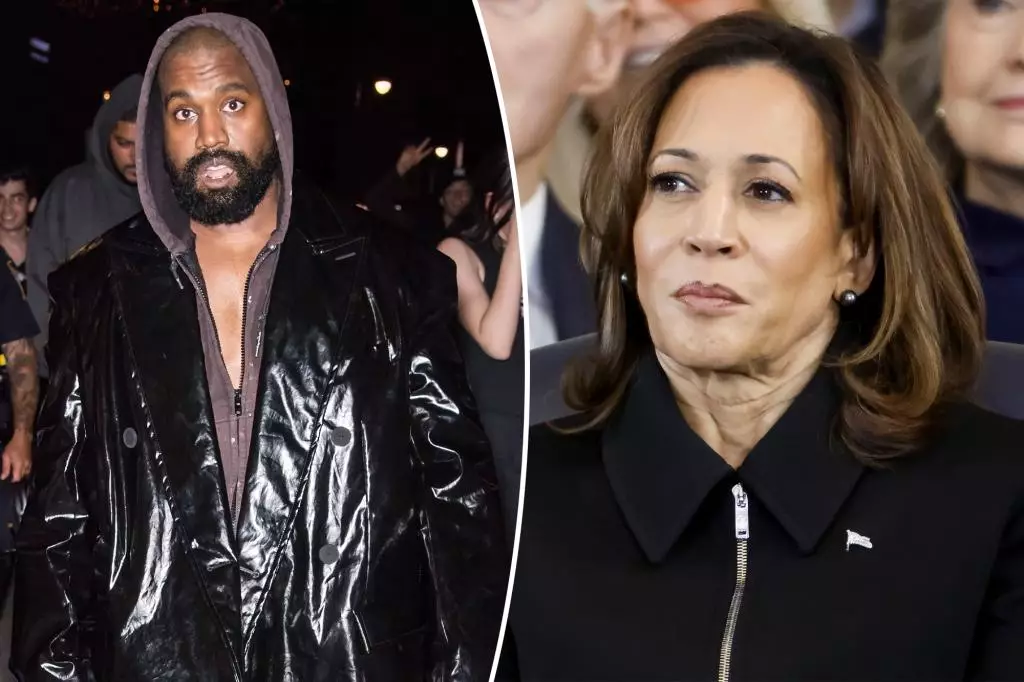Kanye West, a polarizing figure in the world of music and pop culture, continues to make headlines with his controversial statements and actions. Recently, he shared a graphic tweet targeting Vice President Kamala Harris, which prompted a fleeting backlash and a subsequent apology. This incident not only highlights West’s unpredictable nature but also sheds light on the wider implications of celebrity behavior in today’s digital age.
In a now-deleted tweet, West openly expressed disdain for Harris, referencing her loss in the 2024 presidential election and proclaiming, “I used to want to f–k Kamala until she lost. I don’t f–k losers anymore.” Such a statement, rife with sexual innuendo and aggression, reflects not just West’s personal views but also raises questions about his public persona and the ways in which he engages with political figures. The tweet was seen not just as crude but as emblematic of a culture where women, particularly in positions of power, are often subjected to disrespectful commentary.
Following the backlash, West offered an apology in a follow-up post, suggesting that he was merely joking, and further commented, “Naw I’m kidding. Dey don’t control black people no more. Trump 4 life.” This mix of humor and deflection underscores a troubling tendency among some public figures to dismiss accountability through sarcasm, despite the potentially harmful repercussions their statements can carry.
Kanye West’s behavior serves as a case study in the broader discourse about celebrity accountability. In an age where social media is a primary means of communication, the impact of a public figure’s words can be instantaneous and far-reaching. West’s earlier ban from X due to anti-Semitic remarks exemplifies the precarious nature of online platforms where opinions can easily spiral out of control. Celebrities often occupy platforms where their reach and influence dwarf those of ordinary individuals, hence the weight of their narratives can shape public discourse profoundly.
Moreover, this incident highlights the often-neglected responsibility that accompanies celebrity status. When a figure like West – a 24-time Grammy winner – makes flippant remarks about a sitting Vice President, it trivializes not only the challenges women face in politics but also the significance of their roles. By using a platform that can affect millions, West and others like him are called to act more responsibly, fostering an environment where constructive dialogue replaces harmful narratives.
West’s tumultuous history with fellow artist Taylor Swift also resurfaces amid this controversy. The tension between the two has been a significant aspect of pop culture since he infamously interrupted her acceptance speech during the 2009 MTV VMA Awards. The echoes of this long-standing feud illustrate how personal conflicts can become media spectacles, feeding into the fan-driven narratives that often glamorize drama over dialogue.
After years of speculation and songwriting battles, with West previously claiming in his track “Famous” that he “made that b***h famous,” the dynamic between the two continues to captivate public attention. It poses a critical inquiry: Are our media narratives contributing to a culture of conflict instead of resolution? The artistic rivalry encapsulates a larger issue of how social dynamics between men and women, particularly in entertainment, are scrutinized and sensationalized.
Kanye West’s recent stirrings on social media encapsulate the challenges and responsibilities of contemporary celebrities in an interconnected world. Despite the allure of controversy that often surrounds public figures, the need for accountability and respectful dialogue remains paramount. The way figures like West engage with politics, relationships, and other artists not only shapes personal legacies but also influences societal norms and cultural discourse. As audiences, we must also play a part in demanding better from our idols and fostering a culture that values respect and thoughtful engagement over sensationalism. Only then can we hope to see a shift toward healthier interactions across all platforms—social media included.
